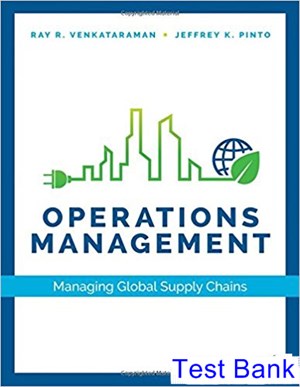Operations Management Managing Global Supply Chains 1st Edition Venkataraman Test Bank

Product details:
- ISBN-10 : 1544339399
- ISBN-13 : 978-1544339399
- Author: Ray R. Venkataraman
Operations Management: Managing Global Supply Chains takes a holistic, integrated approach to managing operations and supply chains by exploring the strategic, tactical, and operational decisions and challenges facing organizations worldwide. Authors Ray R. Venkataraman and Jeffrey K. Pinto address sustainability in each chapter, showing that sustainable operations and supply chain practices are not only attainable, but are critical and often profitable practices for organizations to undertake. With a focus on critical thinking and problem solving, Operations Management provides students with a comprehensive introduction to the field and equips them with the tools necessary to thrive in today’s evolving global business environment.
Table contents:
PART I: INTRODUCTION
Chapter 1: Introduction to Managing Global Operations and Supply Chains
1.1 Supply Chains and Operations Management in the Global Economy
1.2 What Does Operations Management Entail?
1.3 What Does Supply Chain Management Entail?
1.4 An Integrated Perspective on Operations and Supply Chain Management
1.5 The Evolution of Operations and Supply Chain Management
1.6 Current and Emerging Issues in Operations and Supply Chain Management
1.7 Road Map: How This Text Is Organized
Chapter Summary
Key Terms
Discussion and Review Questions
Problems
Case Study 1.1 Multinational Companies and China: Investing for the Long Term
Case Study 1.2 Nintendo’s Wii and Wii U: Absence Makes the Heart Grow Fonder
Video Case
Critical Thinking Exercise
PART II: STRATEGIC DECISIONS
Chapter 2: Operations and Supply Chain Strategies
2.1 Levels of Strategic Planning
2.2 Formulating and Evaluating Operations Strategies
2.3 Formulating and Evaluating Strategies for Service Organizations
2.4 Measuring Productivity as Part of Strategic Planning
2.5 Strategies for Supply Chains
2.6 Global Strategies
2.7 Sustainability Issues
Chapter Summary
Key Terms
Discussion and Review Questions
Solved Problems
Problems
Case Study 2.1 Supply Chain Strategies and Disaster Planning
Video Case
Critical Thinking Exercise
Chapter 3: Project Management
3.1 Projects, Project Teams, and Measuring Success
3.2 Project Life Cycles
3.3 Conceptualizing and Planning Projects
3.4 Scheduling Projects
3.5 Supply Chains for Projects
3.6 Executing, Evaluating, and Terminating Projects
3.7 Sustainability Issues
3.8 Global Projects
Chapter Summary
Key Terms
Discussion and Review Questions
Solved Problems
Problems
Case Study 3.1 Project Management in the Movie Business
Video Case
Critical Thinking Exercise
Supplement for Chapter 3: Project Management
3S.1 Determining the Probability of a Project Being Completed on Time
3S.2 Calculating the Time-Cost Trade-Offs of Crashing a Project
3S.3 Calculating a Project’s Earned Value
Supplement Summary
Key Terms
Discussion and Review Questions
Solved Problems
Problems
Critical Thinking Exercise
Chapter 4: Product and Service Innovations
4.1 Why Companies Develop New Products and Services
4.2 How New Products Are Developed
4.3 New Product Development Concepts and Strategies
4.4 Using Technology to Develop New Products
4.5 Global Product Development
4.6 New Product Development Issues for Supply Chains
4.7 How Services Are Designed
4.8 Legal, Ethical, and Sustainability Issues
Chapter Summary
Key Terms
Discussion and Review Questions
Problems
Case Study 4.1 Redesigning for Efficiency: The Chevrolet Malibu
Video Case
Critical Thinking Exercise
Supplement for Chapter 4: Reliability
4S.1 Understanding Reliability
4S.2 Availability and Maintainability
Supplement Summary
Key Terms
Discussion and Review Questions
Solved Problems
Problems
Chapter 5: Managing for Quality
5.1 Defining Quality
5.2 The Benefits and Costs of Managing Quality
5.3 The Evolution of Quality Management and Its Pioneers
5.4 Major Quality Management Initiatives
5.5 Quality Management Tools and Techniques
5.6 Managing Quality for Supply Chains
5.7 Global Quality Management
5.8 Legal, Ethical, and Sustainability Issues,
Chapter Summary
Key Terms
Discussion and Review Questions
Problems
Case Study 5.1 Pfizer Fixes Problems With Its Cleaning Processes
Case Study 5.2 Partnering to Improve Quality
Case Study 5.3 3M: Finding the Delicate Balance Between Six Sigma and Innovation
Case Study 5.4 Van Halen, Brown M&Ms, and Quality Control
Video Case
Critical Thinking Exercise
Chapter 6: Quality Improvement and Control Tools
6.1 Quality Control Versus Quality Assurance
6.2 Quality Appraisal Tools
6.3 Quality Defect Prevention Tools
6.4 Quality Design Tools
Chapter Summary
Key Terms
Discussion and Review Questions
Solved Problems
Problems
Case Study 6.1 J.D. Power Automobile Surveys: What Does “Quality� Mean, Anyway?
Video Case
Critical Thinking Exercises
Chapter 7: Capacity Planning
7.1 Capacity Planning
7.2 Service Capacity Planning
7.3 Capacity Planning for Supply Chains
7.4 Ethical and Sustainability Issues
7.5 Global Capacity Management
Chapter Summary
Key Terms
Discussion and Review Questions
Solved Problems
Problems
Case Study 7.1 Kirwain’s Capacity Planning Challenge
Video Cases
Critical Thinking Exercises
Chapter 8: Supply Chain Design and Location Planning
8.1 Supply Chain Design and Facility Location Decisions
8.2 Phases in the Supply Chain Design and Location Decision-Making Process
8.3 Analytical Methods for Evaluating Locations
8.4 Ethical and Sustainability Issues
8.5 Global Location Planning
Chapter Summary
Key Terms
Discussion and Review Questions
Problems
Case Study 8.1 Countering the Counterfeiters
Case Study 8.2 Alpharetta Tools
Video Case
Critical Thinking Exercise
Chapter 9: Process Design and Layout Planning
9.1 Designing, Selecting, and Redesigning Manufacturing Processes
9.2 Designing Service Processes
9.3 Designing Processes for Supply Chains
9.4 Global Process Design
9.5 Layout Planning
9.6 Legal, Ethical, and Sustainability Issues
Chapter Summary
Key Terms
Discussion and Review Questions
Problems
Case Study 9.1 Challenges of Redesigning a Plant Layout
Video Case
Critical Thinking Exercise
Supplement for Chapter 9: Tools for Analyzing, Designing, and Selecting Processes and Layouts
9S.1 Process Selection, Design, and Analysis Tools
9S.2 Layout Analysis Tools and Techniques
Supplement Summary
Key Terms
Discussion and Review Questions
Solved Problems
Problems
Critical Thinking Exercises
PART III: INTEGRATIVE DECISIONS
Chapter 10: Supplier Management
10.1 Supplier Management and Its Goals
10.2 The Supplier Management Process
10.3 Managing Service Providers
10.4 Global Supplier Management
10.5 Legal, Ethical, and Sustainability Issues
Chapter Summary
Key Terms
Discussion and Review Questions
Solved Problem
Problems
Case Study 10.1 The Boeing
Video Cases
Critical Thinking Exercise
Chapter 11: Logistics Management
11.1 Integrated Logistics Management
11.2 Order Fulfillment
11.3 Transportation Management
11.4 Packaging
11.5 Materials Handling
11.6 Warehousing Management
11.7 Inventory Management
11.8 Facilities Network Design,
11.9 Global Logistics
11.10 Logistics Outsourcing
11.11 Logistics in the Service Sector
11.12 Ethical and Sustainability Issues
Chapter Summary
Key Terms
Discussion and Review Questions
Problems
Case Study 11.1 How Sustainable Logistics Solutions and Technologies Have Helped Walmart Become More Efficient
Case Study 11.2 Third-Party Logistics and the Mistreatment of Workers
Video Case
Critical Thinking Exercises
Chapter 12: Demand Management and Customer Service
12.1 Demand Management
12.2 Global Demand Management
12.3 Services Demand Management
12.4 Customer Service and Demand Management
12.5 Ethical and Sustainability Issues
Chapter Summary
Key Terms
Discussion and Review Questions
Problems
Case Study 12.1 McDonald’s Reinvents Itself, Again
Case Study 12.2 Predicting the Future Demand for Rural Health Care
Video Cases
Critical Thinking Exercises
Chapter 13: Demand Forecasting Methods
13.1 Introduction to Forecasting and Its Applications
13.2 The Characteristics of Good Forecasts
13.3 Qualitative Versus Quantitative Forecasting Methods
13.4 Measuring and Monitoring the Accuracy of Forecasting Methods
13.5 Monitoring and Controlling Forecasts
13.6 Forecasting for Supply Chains
13.7 Ethical Issues
Chapter Summary
Key Terms
Discussion and Review Questions
Solved Problems
Problems
Case Study 13.1 Forecasting Ticket Demand for the Super Bowl
Case Study 13.2 Ethical Forecasting: If You Torture the Numbers Long Enough, They Can Tell You Anything!
Video Cases
Critical Thinking Exercises
PART IV: TACTICAL DECISIONS
Chapter 14: Lean Operations and Supply Chains
14.1 Introduction to Lean Operations
14.2 The Philosophy of Lean Systems
14.3 Elements of Lean Systems
14.4 Lean Services
14.5 Lean Supply Chains
14.6 Lean Global Supply Chains
14.7 Sustainability Issues
Chapter Summary
Key Terms
Discussion and Review Questions
Solved Problem
Problems
Case Study 14.1 Lean Sustainable Supply Chains at Unilever
Case Study 14.2 TAL Apparel and JCPenney
Critical Thinking Exercise
Appendix 14.1: Value Stream Mapping Symbols
Appendix 14.2: Steps for Developing a Value Stream Map
Chapter 15: Inventory Management
15.1 Types of Inventory
15.2 Inventory Costs
15.3 Inventory Considerations for Supply Chains
15.4 Inventory Management Measures
15.5 Key Features of Effective Inventory Management Systems
15.6 Uncertainty in Supply Chain Inventories: The Bullwhip Effect
15.7 Ethical and Sustainability Issues
15.8 Global Inventory Management
15.9 Service Sector Inventory Management
Chapter Summary
Key Terms
Discussion and Review Questions
Solved Problem
Problems
Case Study 15.1 Inventory Pressures Cause Tuesday Morning to Abandon e-Commerce
Case Study 15.2 Inventory Management in the Age of the Online Shopper
Video Case
Critical Thinking Exercises
Chapter 16: Inventory Control Models
16.1 How Much to Order: Continuous Review Systems
16.2 Economic Production Quantity (EPQ) Model
16.3 EOQ Model with Quantity Discounts
16.4 When to Order: Reorder Point for Continuous Review Systems (EOQ Model)
16.5 How Much to Order: Periodic Review Systems
16.6 How Much to Order: Single-Period Inventory Systems
Chapter Summary
Key Terms
Discussion and Review Questions
Solved Problems
Problems
People also search:
operations management managing global supply chains
operations management managing global supply chains 2nd edition pdf
global operations management definition
harvard business school global supply chain management simulation solution
in general managing global operations is made easier by





